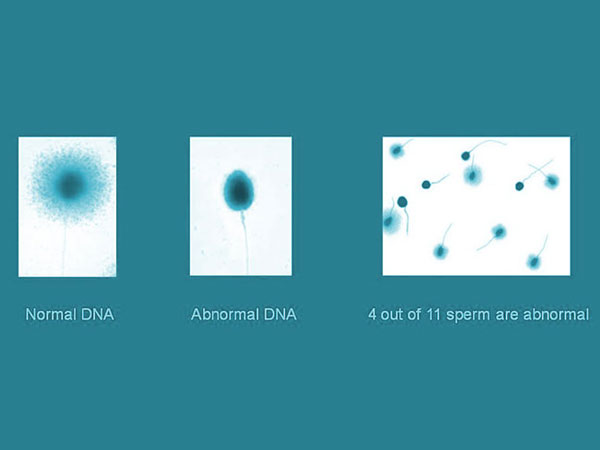
Sperm DNA Fragmentation Treatment Infertility in India

What is Sperm DNA fragmentation?

The integrity of genetic material in the sperm is crucial for successful fertilisation and normal embryo development. Sperm DNA fragmentation is a term used to denote abnormal genetic material within the sperm, which in turn may lead to male subfertility, IVF failure and miscarriage. A conventional semen analysis done for sperm concentration, motility analysis and morphology assessment cannot assess the sperm at the molecular level and as result aid the detection of DNA fragmentation.
A number of sperm DNA fragmentation tests are available on the market, but the one used at the Reproductive Health Group, is the SpermComet test which seems to more detailed information compared to the other tests such as SCSA and TUNEL.
Studies in the literature have shown that:
- High sperm DNA fragmentation affects blastocyst development
- Higher the DNA fragmentation levels, higher the chances of failed assisted conception treatment and miscarriage
- Sperm DNA fragmentation is higher in subfertile men with abnormal sperm parameters
- Men with normal sperm parameters are also found to have high sperm DNA fragmentation

Advantages of the sperm DNA fragmentation test

- Provides a reliable analysis of sperm DNA integrity that may help to identify men who are at risk of subfertility
- Provides information that helps in the clinical diagnosis, management and treatment of male fertility
- Provides prognostic value in assessing the outcome of assisted conception treatment
High rates of sperm DNA fragmentation and pregnancy potential

- Normal, healthy pregnancies do occur in couples where the male partner has high percentage of sperm with fragmented DNA, although the chances are significantly reduced, as the percentage of sperm bearing low levels of DNA fragmentation is much lower
- Embryos derived from sperm with highly fragmented DNA have poor prognosis
- DNA fragmentation could result in initiation of apoptosis (natural cellular death) and mutations resulting in blastocyst arrest, miscarriage and abnormalities in the offspring
- Sperms with high DNA fragmentation fertilising younger oocytes than older oocytes carry a better prognosis of successful pregnancy, as they are much more efficient at DNA repair of defective sperm

Causes of Sperm DNA Fragmentation

In men, the major contributing factor for sperm DNA fragmentation is oxidative stress, which can be associated with one or more of the following:
- Infection
- Pyrexia
- Elevated testicular temperature
- Recreational drugs
- Smoking
- Alcohol
- Stress
- Diet
- Environmental and occupational pollutants
- Advanced chronological age
- Varicocoele
Indications for men who may benefit from the SpermComet test

- Unexplained infertility
- Arrested embryo development
- Poor blastocyst development
- Multiple failed IVF/ICSI treatments
- Recurrent miscarriage
- Advanced chronological age
- Varicocoele
- Poor semen parameters
- Exposure to harmful substances
Treatment of high sperm DNA fragmentation

It depends essentially on the cause. If the damage is caused by free radicals, a change in lifestyle and diet designed to protect against oxidative stress may help reduce the levels of DNA fragmentation. Other treatment options include:
- Antibiotics in the co-existence of an infection
- Life style changes – drugs, smoking and occupation
- Diet – fresh foods, particularly those containing antioxidants and vitamin C & E
- Varicocoele surgery
- Testicular aspiration of sperm (DNA damage occurs at the post-testicular level, hence testicular sperm may have a better DNA integrity than ejaculated sperm)
- ICSI rather than IVF
Initiatives to reduce the levels of fragmentation can be assessed by undertaking a second test three months later.
